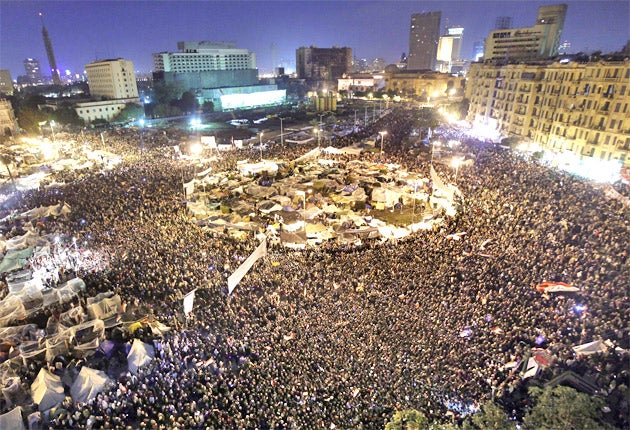Mubarak to face trial for killings of protesters on Tahrir Square

Your support helps us to tell the story
From reproductive rights to climate change to Big Tech, The Independent is on the ground when the story is developing. Whether it's investigating the financials of Elon Musk's pro-Trump PAC or producing our latest documentary, 'The A Word', which shines a light on the American women fighting for reproductive rights, we know how important it is to parse out the facts from the messaging.
At such a critical moment in US history, we need reporters on the ground. Your donation allows us to keep sending journalists to speak to both sides of the story.
The Independent is trusted by Americans across the entire political spectrum. And unlike many other quality news outlets, we choose not to lock Americans out of our reporting and analysis with paywalls. We believe quality journalism should be available to everyone, paid for by those who can afford it.
Your support makes all the difference.The former Egyptian president Hosni Mubarak is to be tried for conspiring to kill demonstrators whose protests brought an end to his 30-year rule.
The move by the military government is seen as an attempt to satisfy growing popular anger in Egypt at its failure, since taking over from 83-year-old Mr Mubarak on 11 February, to prosecute and purge members of the old regime.
The former dictator is being charged with the "premeditated murder of some participants in the peaceful protests of the 25 January revolution".
He is also accused along, with his two sons Alaa and Gamal and a close business associate, with abuse of power in order to make money. Mr Mubarak is currently detained at a hospital in the resort town of Sharm el Sheikh, while his sons are in Tora prison. His 70-year-old wife Suzanne was released on bail after handing $4m and a villa to the state. Charges against Mr Mubarak include accepting as gifts a palace and four villas at Sharm el Sheikh and being part of a conspiracy to sell gas at a cheap price to Israel.
Prosecution of Mr Mubarak, his family and associates has been a central demand of the protesters who are suspicious the military government is planning to let them off the hook. Cairo was swept with rumours that Mr Mubarak was to benefit from an immunity deal under which he would give up part of his fortune and apologise to the Egyptian people for the failings of his regime.
A massive rally, called "Egypt's second revolution", is planned for Friday to protest at the lack of change since Mr Mubarak stepped down after at least 846 protesters had been killed. Instead, many of those taking part in subsequent protests have been jailed, beaten and given long sentences after a summary trial by a military tribunal. "I have not seen such activity in organising a big protest in Cairo since the revolution," said one reform activist.
Protesters are particularly outraged that emergency laws have not been suspended, and are demanding that, at the very least, the police and army should stop torturing people. Official brutality and misuse of arbitrary powers goes on as before, if in a somewhat more muted form. For instance, during a Coptic protest last week, one of those arrested was an electrician taking no part in the demonstration. He was detained when returning home with an electric drill which prosecutors claimed was an "offensive weapon".
Egypt is currently ruled by the Supreme Council of the Armed Forces (SCAF), a shadowy body of senior military leaders which has been very slow to dismantle the ruthless police state over which Mr Mubarak presided. Though SCAF expressed loyalty to the uprising it has failed notably to provide medical aid to thousands injured in the protests and given no compensation to those who lost breadwinners or businesses. The economy is in bad shape after the revolution at a time when many Egyptians have higher expectations. Foreign exchange reserves have been draining away from $36bn to $28bn since the start of the year, tourism earnings are down by $1bn a month, and industry is working at half capacity. Most of the construction sites in Cairo are idle.
The military government is trying to do enough to satisfy popular anger against the Mubaraks and their business cronies without paralysing economic activity or frightening off foreign investment. But such concessions are often seen by critics of the army as yet one more covert attempt to preserve the status quo.
Join our commenting forum
Join thought-provoking conversations, follow other Independent readers and see their replies
Comments